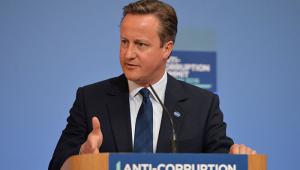Nick Mann | 26 January 2012
European Union leaders need to be ‘bolder’ in how they tackle the eurozone crisis, reduce budget deficits and encourage growth, Prime Minister David Cameron said today.
Speaking at the World Economic Forum in Davos, Switzerland, Cameron said poor growth forecasts showed there was a prospect of Europe getting ‘left behind’. Its lack of competitiveness was its ‘Achilles Heel’, he said, criticising ‘unnecessary’ EU regulation such as the Working Time Directive. ‘We’re still doing things through the EU to make life even harder.’
With this in mind, even considering a Financial Transaction Tax for European Union countries was ‘madness’, he added. Cameron said all proposed EU measures should be tested for their impact on growth.
He called for ‘decisive action’ on trade. EU trade agreements with countries such as India and Canada needed to be finalised by the end of this year, he said, while countries should also explore a potential Europe-Africa trade deal and an agreement with the US.
Cameron said the ‘boldest’ action was needed among the eurozone countries, where the crisis was ‘still weighing down on business confidence and investment’.
Interest rates on government bonds in Italy, Portugal and Spain have all increased over the past year, Cameron said, and as a result ‘urgent’ short-term measures were needed.
‘The October agreement needs to be fully implemented. The uncertainty in Greece must be brought to an end. Europe’s banks recapitalised. As the IMF has said, the European firewall needs to be big enough to deal with the full scale of the crisis,’ he said.
‘And Chancellor Merkel is absolutely right to insist that eurozone countries must do everything possible to get to grips with their own debts.’
Cameron said members of the eurozone would have to make ‘painful decisions’ to address their trade and budget deficits. But, for this to succeed, he said the eurozone would also need to introduce the hallmarks of a successful single currency, including the ‘deepest possible’ economic integration and, potentially, eurobonds.
‘You need the support of single currency partners – and as [International Monetary Fund managing director] Christine Lagarde has set out, a system of fiscal integration and risk sharing, perhaps through the creation of euro area bonds to make that support work,’ he said.
In a speech opening the forum last night, the German Chancellor Angela Merkel also noted the lack of competitiveness of many European countries and the deficits that have accumulated over recent years.
‘There is a clear lack of political structures and underpinnings to make this work,’ she said. ‘We are not going to become faint of heart. But we will not be able to wave a magic wand to address this.
‘At some point in time we have to do something about these weaknesses. The question is – do we dare to have more “Europe”? In the year 2012, yes, we do dare.
Merkel said that while Germany strongly supported the single currency, it was not prepared to make any guarantees. ‘It is not that we don’t wish to show solidarity and have binding commitments,’ she said. ‘But what we don’t want is to promise something that we can’t fulfil.’
At Davos today, the Institute for Public Policy and Research launched Thethird wave of globalisation, which calls for co-ordinated international action to prevent a ‘race to the bottom’ on corporation tax.
Action is also needed to prevent a renewed build-up of the global imbalances that were the principal cause of the global financial crisis, the IPPR said.
In particular, countries running ‘excessive’ deficits such as the US and Italy were urged to rebalance their economies away from debt-fuelled domestic consumption and towards savings and exports. Meanwhile, those with a large surplus, such as China and Germany, should reduce their dependence on exports and build domestic consumption, the report said.












